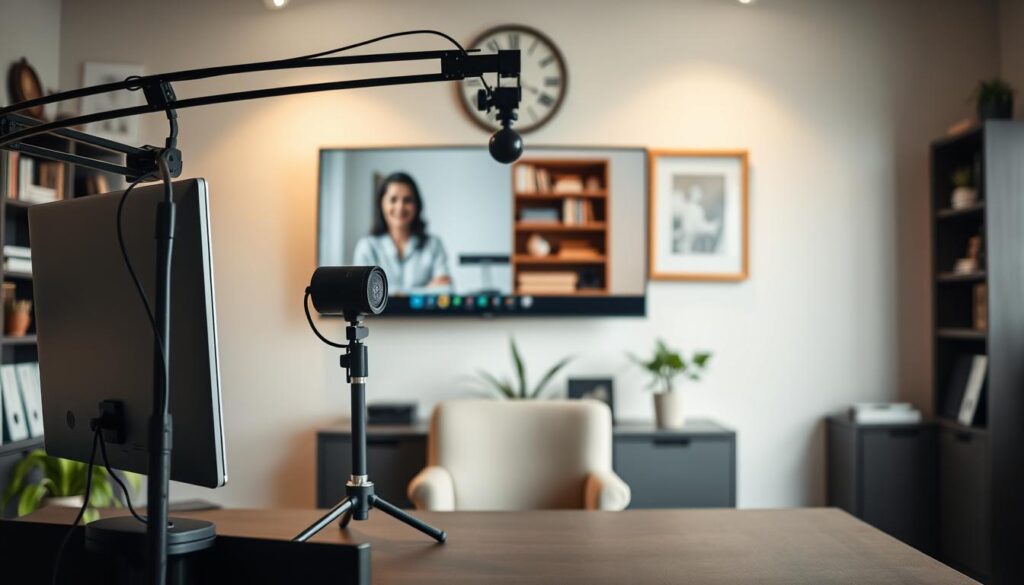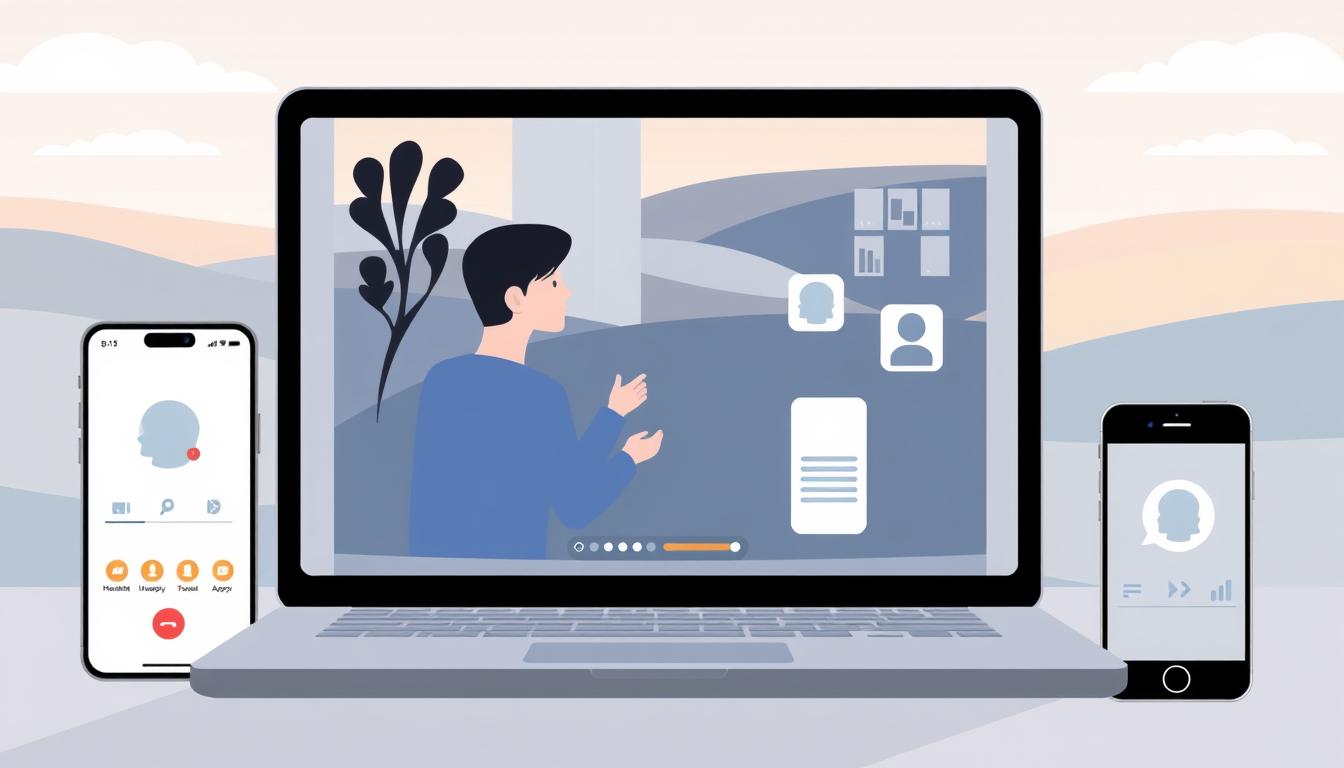In today’s fast-paced world, seeking support for mental well-being has become increasingly important. The demand for accessible and convenient therapy options has led to a significant rise in online mental health counseling.
This shift towards digital counseling services has made professional support more accessible to individuals regardless of their location or mobility limitations.
As we explore the various aspects of online mental health counseling, we’ll examine its benefits, types of services, and effectiveness in addressing common mental health issues.
Key Takeaways
- Online counseling provides accessible and convenient therapy options.
- Digital transformation has made professional counseling more accessible.
- Virtual therapy sessions address common mental health issues effectively.
- Understanding technology requirements and cost considerations is crucial.
- Finding the right counselor is essential for effective treatment.
Understanding Online Mental Health Counseling

The concept of online mental health counseling is transforming the way we approach mental wellness. This form of therapy leverages digital technologies to provide accessible and effective mental health support.
Definition and Core Components
Online mental health counseling refers to the provision of mental health services through digital platforms. It encompasses various therapeutic approaches and tools, ensuring comprehensive care.
Evolution of Digital Mental Health Services
Digital mental health services have undergone significant evolution, driven by technological advancements and growing recognition of mental health needs. Key developments include:
- The field of digital mental health services has evolved significantly, moving from basic text-based support to sophisticated platforms.
- Technological advancements have enabled secure video conferencing, encrypted messaging, and interactive therapeutic tools.
- The COVID-19 pandemic accelerated adoption and innovation in online mental health services.
- Regulatory frameworks have adapted to accommodate growing demand for telehealth services.
- Emerging technologies like AI, VR, and mobile applications are expanding possibilities for remote mental health support.
Benefits of Virtual Therapy Sessions
Virtual therapy sessions have revolutionized mental health counseling by offering numerous benefits to clients. This modern approach to therapy has made mental health support more accessible and convenient.
Accessibility and Convenience Factors
Virtual counseling offers increased accessibility for clients who may have difficulty attending in-person sessions due to location or mobility issues. The convenience of attending therapy from one’s own home can significantly reduce barriers to seeking mental health support.
- Clients can schedule sessions around their busy lives, making it easier to maintain consistency in therapy.
- Virtual therapy eliminates the need for commuting, saving time and reducing stress.
Privacy and Comfort Advantages
Many clients report feeling more comfortable discussing sensitive issues from the privacy of their own homes. The reduced stigma associated with virtual sessions can make therapy more accessible to those who might otherwise avoid seeking help.
- The privacy of online sessions creates a sense of psychological safety, allowing clients to open up more freely.
- Clients have greater control over their therapeutic environment, enabling them to create conditions that help them feel most at ease.
Types of Online Mental Health Counseling Services
The diversity in online mental health counseling services allows clients to choose the most comfortable and effective therapy format. This variety is crucial in ensuring that individuals can access the mental health support they need in a way that suits them best.
Video-Based Therapy Options
Video-based therapy options provide face-to-face interaction, allowing for a more personal and engaging therapeutic experience. This format combines the benefits of traditional in-person therapy with the convenience of online access.
Text and Chat Counseling Platforms
Text and chat counseling platforms offer a more discreet and flexible option for those who prefer written communication or have limited time for scheduled sessions. These platforms provide immediate support and can be particularly helpful for individuals dealing with acute mental health issues.
Phone-Based Therapy Services
Phone-based therapy services provide real-time verbal communication without requiring video capability, making them accessible to clients with limited internet bandwidth or older technology. Key benefits include:
- Real-time verbal communication without video requirements
- Reduced self-consciousness compared to video sessions
- Less technical setup and potential disruptions
- Deeper focus on therapeutic conversation
- Maximum flexibility for clients with unpredictable schedules
These counseling services cater to various client needs, ensuring that mental health support is accessible and effective. By offering diverse formats, online health services can reach a broader audience and provide tailored services to those in need.
Common Mental Health Issues Addressed Online
The flexibility of online mental health counseling allows it to cater to diverse mental health needs. Online platforms have adapted to accommodate multiple participants, making relationship and family therapy accessible remotely. This format can sometimes increase participation from family members who might otherwise be reluctant to attend in-person sessions.
Anxiety and Depression Treatment
Online counseling is effective for treating anxiety and depression, offering a comfortable and private space for individuals to share their experiences. Studies have shown that online therapy can be as effective as in-person therapy for these conditions according to recent research.
Trauma and PTSD Counseling
Trauma and PTSD counseling online provides a safe environment for individuals to process their experiences. Therapists use various techniques to ensure clients feel secure and supported throughout the virtual sessions.
Relationship and Family Therapy
Online family therapy has become increasingly popular, allowing multiple family members to participate from different locations. This modality is particularly useful during significant life changes or when family members are geographically dispersed.
| Mental Health Issue | Online Counseling Benefits | Key Features |
|---|---|---|
| Anxiety and Depression | Comfort, privacy, accessibility | Cognitive-behavioral therapy, stress management |
| Trauma and PTSD | Safe space, controlled environment | Trauma-focused CBT, support groups |
| Relationship and Family Issues | Convenience, increased participation | Family systems therapy, communication skills |
Effectiveness of Online Mental Health Counseling
The effectiveness of online mental health counseling has been a subject of extensive research, yielding positive outcomes. Studies have shown that online therapy can be just as effective as traditional in-person therapy for many individuals.
Research and Clinical Outcomes
Research into the efficacy of online therapy has highlighted several key findings. Comparative studies have found that the therapeutic alliance can be developed effectively in online settings. Most evidence-based approaches maintain their effectiveness when delivered online.
Comparison to Traditional In-Person Therapy
While online and in-person therapy share many similarities, there are some differences in the therapeutic experience. Online counseling may offer advantages for certain issues, such as social anxiety. Client satisfaction rates are comparable between online and in-person health services, with many appreciating the unique benefits of each modality, enhancing overall practice.
Technology Requirements for Virtual Sessions

To participate in online mental health counseling, individuals need to ensure they have the necessary technology in place. This includes both hardware and software components that facilitate a smooth and effective virtual therapy experience.
Essential Hardware and Software
For online counseling, a reliable computer or mobile device with a stable internet connection is crucial. The device should have a high-quality webcam and microphone to ensure clear video and audio during sessions.
Privacy and Security Considerations
Reputable online mental health services use HIPAA-compliant platforms with end-to-end encryption to protect client confidentiality. To maintain privacy, clients should use secure, password-protected internet connections and find a private space for sessions.
- Utilize a secure and private physical space for sessions, ideally a room with a door that closes.
- Understand the privacy policies and terms of service for the therapy platform being used.
- Consider additional privacy measures such as VPNs or secure browsers.
Finding the Right Online Mental Health Counselor
Identifying the ideal online mental health counselor requires careful evaluation of several factors. This process is crucial for ensuring that you receive effective therapy tailored to your specific needs.

Credentials and Licensing to Look For
When searching for an online mental health counselor, it’s essential to verify their credentials and licensing. Look for professionals with relevant qualifications and experience in mental health counseling. Ensure they are licensed to practice in your state or country.
Specialization and Experience Factors
Different mental health professionals specialize in various treatment approaches and populations. Consider therapists with experience in your specific concerns, whether that’s anxiety, depression, trauma, or relationship issues. Many online platforms allow you to filter therapists by their areas of expertise and therapeutic approaches.
- Beyond general credentials, consider a therapist’s specialized training and experience in addressing your specific concerns.
- Many online platforms allow you to filter therapists by their areas of expertise, therapeutic approaches, and populations they commonly work with.
- A therapist’s years of experience, particularly in online counseling formats, can be relevant when selecting a provider.
- Consider whether cultural competence is important for your therapy experience.
- Many therapists offer brief consultation calls before beginning formal therapy.
Cost Considerations and Insurance Coverage
Understanding the financial aspects of online mental health counseling is crucial for those seeking therapy. The costs associated with online therapy can vary widely based on factors such as the therapist’s credentials, session frequency, and the platform used.
Pricing Models
Typical pricing models for online mental health services include session-based fees, package deals, and subscription models. Some platforms charge per session, while others offer discounted rates for bulk bookings.
Insurance and Reimbursement
Many online therapy providers now accept insurance, and some offer reimbursement options for clients. It’s essential to check with your insurance provider to understand what is covered under your plan. For more information on mental health resources, you can visit https://impsedu.in/.
| Provider Type | Pricing Model | Insurance Acceptance |
|---|---|---|
| Private Practitioners | Session-based | Varies |
| Online Therapy Platforms | Subscription-based | Often |
| Community Clinics | Sliding Scale | Usually |
Financial Assistance
Some online therapy platforms offer financial aid programs, including sliding scale fees and scholarships, to make mental health services more accessible. Community mental health centers also provide low-cost options.
Getting Started with Online Counseling
Online counseling offers a convenient and accessible way to address mental health concerns from the comfort of your own space. To make the most of this experience, it’s essential to be prepared.

Initial Assessment Process
The initial assessment is a crucial step in online counseling, allowing your therapist to understand your mental health needs. This process typically involves a questionnaire and an introductory session to discuss your goals and expectations.
Setting Up Your First Session
To ensure a smooth first session, several practical steps can be taken. These include testing your technology, finding a private and comfortable space, and considering what you want to discuss.
- Preparing for your first online counseling session involves practical steps like testing your technology, ensuring your internet connection is stable, and finding a private, comfortable space where you won’t be interrupted.
- Most platforms send reminder emails with links to join your session, along with instructions for downloading any necessary software or applications ahead of time.
- Creating a conducive environment for therapy includes minimizing potential distractions, having water nearby, using headphones for better audio quality and privacy, and considering lighting so your therapist can see you clearly.
- Having a backup plan for technical difficulties, such as a phone number to call if video fails, helps ensure your session can proceed even if technological challenges arise.
- Taking a few minutes before your session to reflect on what you hope to discuss and accomplish can help you make the most of your time and start building a productive therapeutic relationship from the first meeting.
Overcoming Common Barriers to Online Therapy

Despite the advantages of online mental health counseling, several challenges can impact the therapeutic experience.
Effective online therapy requires addressing these barriers to ensure a productive therapy session. This includes overcoming technology challenges and building a strong therapeutic relationship with clients.
Technology Challenges and Solutions
Technical issues can hinder online sessions. Ensuring reliable internet and using quality hardware helps. Clients should test equipment before sessions.
Building Therapeutic Rapport Virtually
Therapists build rapport by maintaining eye contact through cameras and using verbal acknowledgment. Clients contribute by being open and providing feedback.
The Future of Online Mental Health Counseling
The future of online mental health counseling is poised for significant advancements. As we look ahead, it’s clear that the integration of technology and mental health services will continue to shape the field.
Emerging Technologies and Approaches
New technologies are emerging to support online mental health counseling, including artificial intelligence and virtual reality. These innovations are expected to enhance the therapeutic experience and improve outcomes.
- AI-powered chatbots are being developed to provide initial assessments and support.
- Virtual reality is being used to create immersive therapy environments.
Integration with Traditional Healthcare
The integration of online mental health services with traditional healthcare systems is increasing. This collaborative approach aims to provide more comprehensive and accessible care.
- Primary care practices are incorporating mental health screening and referrals to online therapy services.
- Electronic health record systems are evolving to facilitate secure information sharing between online mental health providers and other healthcare professionals.
Conclusion
The growth of online mental health counseling reflects a broader transformation in how we approach mental health. As technology continues to evolve, virtual therapy options are becoming increasingly sophisticated. Online counseling has transformed from an alternative to a mainstream approach, delivering effective support across geographical boundaries. With its accessibility, convenience, and privacy advantages, online mental health counseling is reducing barriers to care. It represents a valuable expansion of options for addressing growing mental health needs, whether used alone or with traditional in-person services.
FAQ
What are the typical requirements for a master’s program in counseling?
Most graduate programs require a bachelor’s degree, letters of recommendation, and a personal statement. Some may also require GPA scores or internship experience.
How do I know if a counselor is licensed and qualified?
You can check a counselor’s credentials through state licensing boards or professional organizations. Look for certifications and specializations that align with your needs.
What kind of support can I expect from a counselor?
A counselor can provide a safe and non-judgmental space to discuss your concerns. They can offer guidance, resources, and strategies to help you achieve your goals.
How long does a typical counseling program last?
The length of a counseling program varies depending on the degree and institution. A master’s program typically takes two to three years to complete.
Can I receive financial aid for a counseling program?
Many graduate programs offer financial aid, such as scholarships, grants, and assistantships. You can also explore external funding opportunities.
What are the benefits of practicum or internship experience?
Practicum or internship experience provides hands-on training and the opportunity to apply theoretical knowledge in real-world settings.
How do counselors maintain client confidentiality?
Counselors are bound by laws and ethics to maintain client confidentiality. They use secure communication methods and store records securely.
Can counseling be effective for anxiety and depression?
Yes, counseling can be an effective treatment for anxiety and depression. Counselors use evidence-based approaches to help clients manage symptoms and improve their well-being.

